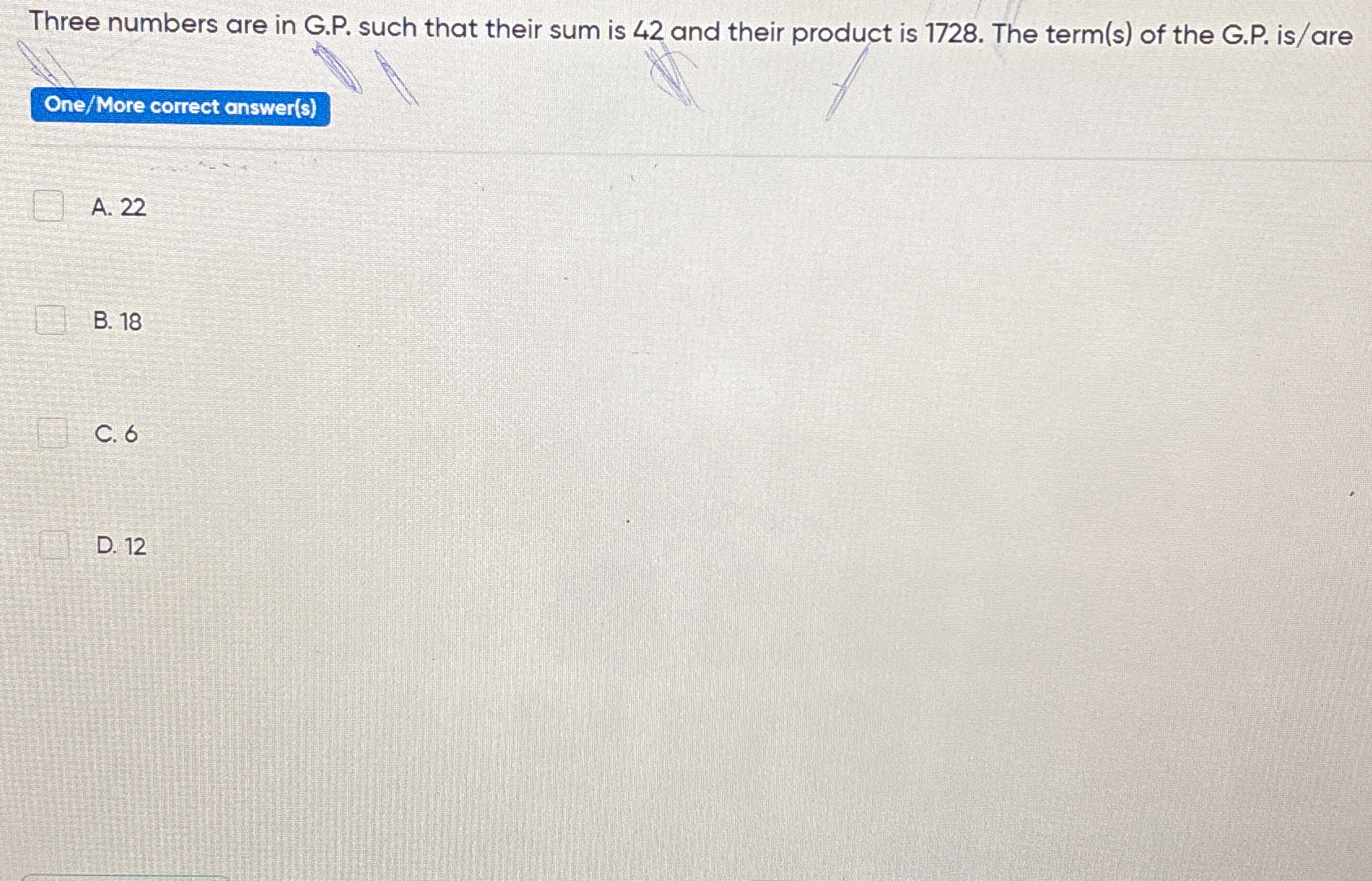Three numbers are in G.P. such that their sum is 42 and their product is 1728. The term(s) of the G.P. is/are?

Understand the Problem
The question is asking to find three numbers that form a geometric progression (G.P.) with a given sum of 42 and a product of 1728. It requires solving for the terms of the sequence based on the constraints provided.
Answer
The terms of the G.P. are $6$, $12$, and $24$.
Answer for screen readers
The terms of the G.P. are $6$, $12$, and $24$.
Steps to Solve
- Define the terms of the G.P.
Let the three numbers in the geometric progression be $a$, $ar$, and $ar^2$, where $a$ is the first term and $r$ is the common ratio.
- Set up the sum equation
According to the problem, their sum is 42: $$ a + ar + ar^2 = 42 $$
Factoring out $a$ gives: $$ a(1 + r + r^2) = 42 $$
- Set up the product equation
The problem states that their product is 1728: $$ a \cdot ar \cdot ar^2 = 1728 $$ This simplifies to: $$ a^3 r^3 = 1728 $$
- Express variables in terms of each other
From the product equation, we can solve for $a^3$: $$ a^3 = \frac{1728}{r^3} $$
- Substitute into the sum equation
Substituting $a^3$ into the sum equation gives: $$ \sqrt[3]{\frac{1728}{r^3}}(1 + r + r^2) = 42 $$
- Solve for $r$
Calculating $1728$ gives: $$ 1728 = 12^3 \implies a = 12/r $$ So substituting: $$ (1 + r + r^2) \cdot \frac{12}{r} = 42 $$ This simplifies to: $$ 12(1 + r + r^2) = 42r $$
- Rearranging the equation
Rearranging it leads to: $$ 12 + 12r + 12r^2 = 42r $$ $$ 12r^2 - 30r + 12 = 0 $$
- Using the quadratic formula
Using the quadratic formula $r = \frac{-b \pm \sqrt{b^2 - 4ac}}{2a}$, where $a = 12$, $b = -30$, and $c = 12$: $$ r = \frac{30 \pm \sqrt{(-30)^2 - 4 \cdot 12 \cdot 12}}{2 \cdot 12} $$ $$ r = \frac{30 \pm \sqrt{900 - 576}}{24} $$ $$ r = \frac{30 \pm \sqrt{324}}{24} $$ $$ r = \frac{30 \pm 18}{24} $$
Calculating gives two possible values: $$ r_1 = 2 \quad \text{and} \quad r_2 = \frac{1}{3} $$
- Find corresponding values of a
For $r = 2$: $$ a = \frac{12}{2} = 6 $$ Numbers are $6$, $12$, $24$.
For $r = \frac{1}{3}$: $$ a = 12 \cdot 3 = 36 $$ Numbers are $36$, $12$, $4$.
- Verify the sums and products
Verify both sets:
-
For $6, 12, 24$:
- Sum: $6 + 12 + 24 = 42$, Product: $6 \cdot 12 \cdot 24 = 1728$.
-
For $36, 12, 4$:
- Sum: $36 + 12 + 4 = 52$, Product: $36 \cdot 12 \cdot 4 = 1728$ (not valid).
Final valid numbers in G.P. are: $$ 6, 12, 24 $$.
The terms of the G.P. are $6$, $12$, and $24$.
More Information
In a geometric progression, each term is obtained by multiplying the previous term by a constant ratio. This problem not only involves finding the terms but also ensures they meet given constraints of sum and product.
Tips
- Confusing the order of operations when calculating the sum or product.
- Misapplying the quadratic formula by not properly simplifying or ignoring negative solutions when they aren't applicable to the given context.
AI-generated content may contain errors. Please verify critical information